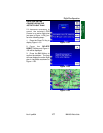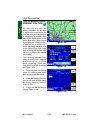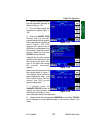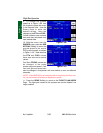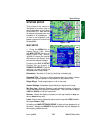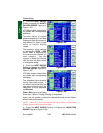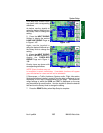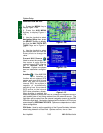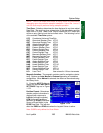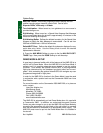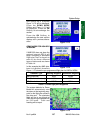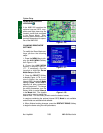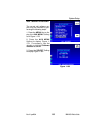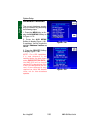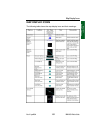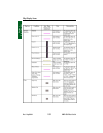
1-85
Rev 2 Apr/2004 KMD 250 Pilot's Guide
Section 1
Basic Operation
NOTE: The 0.3 nm scale could result in overly active roll performance
depending upon the particular autopilot installation. Use of the 1 nm or 5
nm CDI scale may be preferred during autopilot operation.
Time Zone: Selection determines the time displayed in any time related
Data Field. The next line gives a description of the abbreviation and the
offset from UTC time. When Local Time is selected the UTC offset field
will be an entry field to input the local offset value. The following is a list
of the available Time Zone options:
UTC Coordinated Universal Time/Zulu
GST Greenland Standard Time UTC-3
GDT Greenland Daylight Time UTC-2
ATS Atlantic Standard Time UTC-4
ATD Atlantic Daylight Time UTC-3
EST Eastern Standard Time UTC-5
EDT Eastern Daylight Time UTC-4
CST Central Standard Time UTC-6
CDT Central Daylight Time UTC-5
MST Mountain Standard Time UTC-7
MDT Mountain Daylight Time UTC-6
PST Pacific Standard Time UTC-8
PDT Pacific Daylight Time UTC-7
AKS Alaska Standard Time UTC-9
AKD Alaska Daylight Time UTC-8
HAS Hawaii Standard Time UTC-10
HAD Hawaii Daylight Time UTC-9
SST Samoa Standard Time UTC-11
SDT Samoa Daylight Time UTC-10
LCL Local Time User entered in 1/2 hour increments
Magnetic Variation: The magnetic variation used for navigation calcula-
tions. Options are Auto, Manual or External depending on installation
configuration. When Manual is selected, the offset can be entered using
the Rotary Knob.
5. Press the NEXT Softkey to
display the second NAV DATA
SETTINGS Page as in Figure
1-172.
Position Format: Determines
whether position information is
displayed with reference to
Lat/Lon (Latitude/Longitude),
UTM (Universal Transverse
Mercator) or OSGB (Ordinance
Survey of Great Britain) in the
PPOS Data Field. This will also
affect the PBRG and PDIS data when the Joystick Pointer is active.
Note: OSGB is only defined for Great Britain.
System Setup
Figure 1-172



